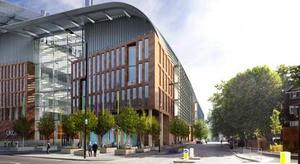BiolabsTerror attack fears over London virus superlab
Experts express concern over the 600 million Pound virus “superlab” planned for St. Pancras, London; the 14-story, maximum security site containing viruses including malaria, tuberculosis, bird and swine flu, cancer cells, and HIV would need to be “bulletproof” to withstand not only an earthquake, a bomb, or fire — there are also worries that Tube trains running through King’s Cross and Euston stations could ruin delicate and expensive laboratory equipment

Artist rendering of London's planned virus superlab // Source: thisislondon.co.uk
One of Britain’s leading bio-scientists yesterday voiced fears over the safety of a £600 million virus “superlab” planned for St. Pancras, London.
Professor Guy Dodson, who has worked at Oxford University, warned that the 14-storey, maximum security site containing viruses including malaria, tuberculosis, bird and swine flu, cancer cells, and HIV would need to be “bulletproof.” He told the Evening Standard: The issues are if you have an earthquake, some idiot lets a bomb off or there’s a fire at St Pancras International. These are extreme examples but you don’t want that building to suffer a serious knockabout when you’ve got this material in there.
The unspoken concern is terrorism because it’s a natural target. We need to know the capacity they have for dealing with the unexpected.
The biochemist’s fears echo those of some of the thousands living nearby.
The U.K. Center for Medical Research and Innovation will have several underground laboratories.
Professor Dodson is also concerned that vibrations from Tube trains running through King’s Cross and Euston could ruin delicate and expensive laboratory equipment.
In written evidence to a Commons Science and Technology select committee inquiry, he wrote: “I fear that the £600 million funding will not be sufficient to meet the uncertainties in building and equipping the laboratories.”
The consortium behind the project includes the Medical Research Council, Cancer Research U.K., and the Wellcome Trust. The Evening Standard reports that the center, which has won planning permission from Camden council and been approved by London Mayor Boris Johnson, said biosecurity will be among the tightest in Britain.
A UKCMRI spokesman said: “A number of submissions have been made. We look forward to discussing with MPs the development of this world-leading institute which represents a superb investment in the battle to improve the health of people across the capital and country.”
